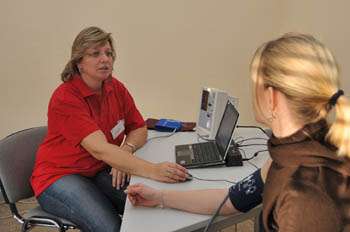Positive signals and warning signs: Results of German health survey published in 34 articles

The majority of Germans feel healthy: their self-rated health has improved, particularly among the elderly. Tests on functional capabilities in old age show: restrictions in everyday life affect only a minority of senior citizens. There is a general trend towards more sports activities. One-fourth of adults practise sports for at least two hours a week on a regular basis.
These are only some of the results of the first wave of the "German Health Interview and Examination Survey for Adults" (DEGS1) conducted by the Robert Koch Institute. The results of DEGS1 have just been published with 34 articles in the Bundesgesundheitsblatt (May/June 2013). The DEGS1 results include both positive signals and warning signs and constitute an important basis for evidence-based prevention strategies.
The DEGS1 study results clearly show, for instance, that metabolic diseases play an important role. The number of diabetics has increased since the last comparable RKI study, the Federal Health Survey 1998. At present 7.2% of the people living in Germany suffer from diabetes. In 17.9% of men and 20.3% of women, total cholesterol levels are strongly elevated. People with a low socioeconomic status report poorer health and are more frequently ill than persons with a higher status; they have, for instance, also more often diabetes. Every fifth person in Germany has experienced psychological violence within one year.
Overall, 7,238 persons went through the two-hour examination and interview programme at one of the 180 study centres; another 914 went only through the interview programme. Data collection took place from November 2008 to December 2011. The examination component adds a variety of information to the conducted interviews. The blood examination supplied, for instance, findings on the existence of a so far unknown diabetes and thus supplemented the medical diagnosis reported in the interview. DEGS1 data also serve as reference data, e.g. measurement data concerning physical fitness that were collected for the first time in a nationwide sample at the same time as information on physical activity habits. First data on selected topics had already been presented at a symposium in June 2012.
DEGS is one of the components of the RKI health monitoring programme. The health monitoring programme, i.e. the on-going assessment and analysis of the health condition of the population, is financed by the Federal Ministry of Health and the Robert Koch Institute and has been reinforced by the RKI 2010 programme.
The articles from the Bundesgesundheitsblatt are available in PDF format. Moreover, photos, video footage, a summary, an abstract collection, a key issues paper and other information on DEGS1 are available on www.degs-studie.de/english.
More information: Articles with results in the "Bundesgesundheitsblatt"















